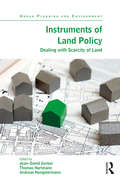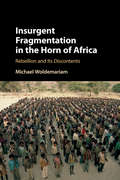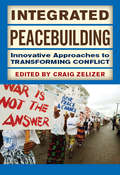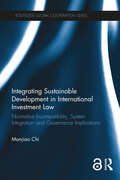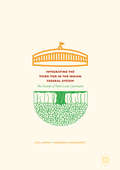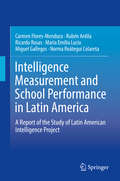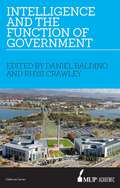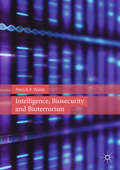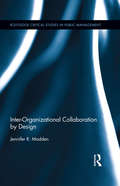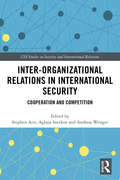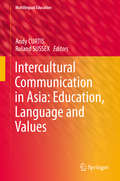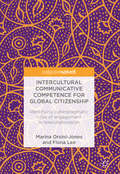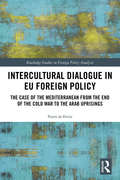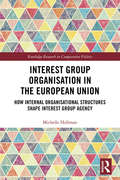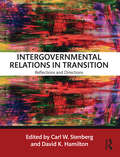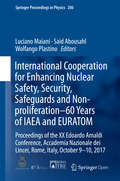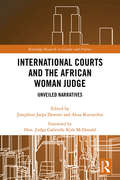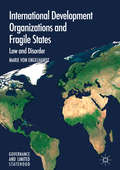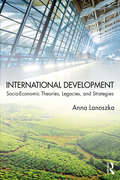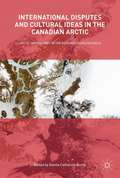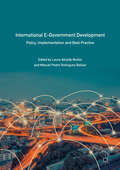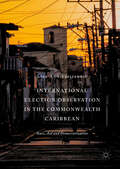- Table View
- List View
Instruments of Land Policy: Dealing with Scarcity of Land (Urban Planning and Environment)
by Thomas Hartmann Jean-David Gerber Andreas HengstermannIn dealing with scarce land, planners often need to interact with, and sometimes confront, property right-holders to address complex property rights situations. To reinforce their position in situations of rivalrous land uses, planners can strategically use and combine different policy instruments in addition to standard land use plans. Effectively steering spatial development requires a keen understanding of these instruments of land policy. This book not only presents how such instruments function, it additionally examines how public authorities strategically manage the scarcity of land, either increasing or decreasing it, to promote a more sparing use of resources. It presents 13 instruments of land policy in specific national contexts and discusses them from the perspectives of other countries. Through the use of concrete examples, the book reveals how instruments of land policy are used strategically in different policy contexts.
Insurgent Fragmentation in the Horn of Africa: Rebellion and its Discontents
by Michael WoldemariamWhen insurgent organizations factionalize and fragment, it can profoundly shape a civil war: its intensity, outcome, and duration. In this extended treatment of this complex and important phenomenon, Michael Woldemariam examines why rebel organizations fragment through a unique historical analysis of the Horn of Africa's civil wars. Central to his view is that rebel factionalism is conditioned by battlefield developments. While fragmentation is caused by territorial gains and losses, counter-intuitively territorial stalemate tends to promote rebel cohesion and is a critical basis for cooperation in war. As a rare effort to examine these issues in the context of the Horn of Africa region, based upon extensive fieldwork, this book will interest both scholarly and non-scholarly audiences interested in insurgent groups and conflict dynamics.
Integrated Peacebuilding: Innovative Approaches to Transforming Conflict
by Craig ZelizerIntegrated Peacebuilding addresses the importance of weaving peacebuilding methods into diverse sectors including development, humanitarian assistance, gender, business, media, health, and the environment?areas where such work is needed the most. Incorporating peacebuilding approaches in these fields is critical for transforming today's protracted conflicts into tomorrow's sustainable peace. Covering both theory and practice, Dr. Zelizer and his team of leading academics and practitioners present original essays discussing the infrastructure of the peacebuilding field?outlining key actors, donors, and underlying motivations?as well as the ethical dilemmas created by modern conflict. Exploring both the challenges and lessons to be found in this emerging field, Integrated Peacebuilding is perfect for courses on peacebuilding, conflict resolution, international development, and related fields.
Integrating Social Media into Information Systems: Requirements, Gaps, and Potential Solutions (G - Reference, Information and Interdisciplinary Subjects)
by Parisa Roshan Isaac R. Porche III Ryan Andrew Brown Astrid Stuth Cevallos Osonde A. Osoba Joshua Mendelsohn Douglas Douglas Yeung John Bordeaux Timothy R. Gulden Laura Kupe Luke J. Matthews Katharine Sieck Sarah SolimanThis report examines the technical challenges associated with incorporating bulk, automated analysis of social media information into procedures for vetting people seeking entry into the United States. The authors identify functional requirements and a framework for operational metrics for the proposed social media screening capabilities and provide recommendations on how to implement those capabilities.
Integrating Sustainable Development in International Investment Law: Normative Incompatibility, System Integration and Governance Implications (ISSN)
by Manjiao ChiThe current international investment law system is insufficiently compatible with sustainable development. To better address sustainable development concerns associated with transnational investment activities, international investment agreements should be made more compatible with sustainable development.Integrating Sustainable Development in International Investment Lawpresents an important systematic study of the issue of sustainable development in the international investment law system, using conceptual, normative and governance perspectives to explore the challenges and possible solutions for making international investment law more compatible with sustainable development. Chi suggests that to effectively address the sustainable development concerns associated with transnational investment activities, the international investment agreements system should be reformed. Such reform should feature redesigning the provisions of the agreements, improving the structure of international investment agreements, strengthening the function of soft law, engaging non-state actors and enhancing the dispute settlement mechanism.The book is primarily aimed at national and international treaty and policy-makers, lawyers and scholars. It is also suitable for graduate students studying international law and policy-making.The Open Access version of this book, available at http://www.taylorfrancis.com, has been made available under a Creative Commons Attribution-Non Commercial-No Derivatives (CC-BY) 4.0 license.
Integrating Sustainable Development in International Investment Law: Normative Incompatibility, System Integration and Governance Implications (Routledge Global Cooperation Series)
by Manjiao ChiThe current international investment law system is insufficiently compatible with sustainable development. To better address sustainable development concerns associated with transnational investment activities, international investment agreements should be made more compatible with sustainable development. Integrating Sustainable Development in International Investment Law presents an important systematic study of the issue of sustainable development in the international investment law system, using conceptual, normative and governance perspectives to explore the challenges and possible solutions for making international investment law more compatible with sustainable development. Chi suggests that to effectively address the sustainable development concerns associated with transnational investment activities, the international investment agreements system should be reformed. Such reform should feature redesigning the provisions of the agreements, improving the structure of international investment agreements, strengthening the function of soft law, engaging non-state actors and enhancing the dispute settlement mechanism. The book is primarily aimed at national and international treaty and policy-makers, lawyers and scholars. It is also suitable for graduate students studying international law and policy-making.
Integrating the Third Tier in the Indian Federal System
by Atul Sarma Debabani ChakravartyThis book discusses the evolution of the third tier of the Indian federal system, with a focus on rural local governance (commonly known as Panchayati Raj) against the backdrop of important theoretical and empirical literature on the relevance and effectiveness of service delivery in the decentralized system. It evaluates the quintessence of the functioning of the Panchayati Raj in the past two decades of its existence. This pioneering book also discusses the treatment of the third-tier government in the inter-governmental fiscal transfer framework and the delineation of the unique institution of local self-government in the Northeastern Indian States. In the light of the loosely evolved fiscal relations between three levels of government, it has been observed that local self-governments in the bottom tier have not been truly empowered yet. The book argues in favor of integrating the third-tier government into the Indian federal system and suggests how this could be achieved.
Intelligence Measurement and School Performance in Latin America: A Report of the Study of Latin American Intelligence Project
by Carmen Flores-Mendoza Rubén Ardila Ricardo Rosas María Emilia Lucio Miguel Gallegos Norma Reátegui ColaretaThis book presents the results of the most complete and updated assessment of cognitive resources of students in Latin America: the Study of Latin American Intelligence (SLATINT). During four years, top researchers of the region used a standardized set of cognitive measures to assess 4,000 students aged between 14 and 15 years from six countries: Brazil, Argentina, Mexico, Chile, Colombia and Peru. The data collected and now analyzed in this volume is a first step to understand the human cognitive capital of the region, a crucial resource for any country today. Intelligence research has shown that the cognitive skills of a population are strongly associated with the school performance of its students and the development of a nation. This makes Intelligence Measurement and School Performance in Latin America a valuable tool both for Latin American researchers and authorities engaged in the improvement of each country’s human resources and for psychologists, educators and other social scientists dedicated to the study of the impact of intelligence in the development of nations.
Intelligence and the function of government
by Rhys Crawley Daniel BaldinoIntelligence plays an important, albeit often hidden hand, in the everyday function of government. Australia's intelligence agencies—collectively referred to as the Australian Intelligence Community (AIC)—are an established and fundamental component of the bureaucracy: they keep watch on potential problems in the name of national security, exploit weaknesses in the name of national interests, and build a picture of the complexities of the broader world for their consumers—other domestic government departments, partner intelligence agencies overseas and, most importantly, Australia's policy-makers. Their aim is to provide the government with 'information'—for that is essentially what intelligence is—to better enable it to tackle the issues confronting it; to be better armed, informed and forewarned of what might lay ahead; and to facilitate coherent policy-making. But we should not expect intelligence to be perfect, nor should we think that good intelligence guarantees good policy. This book draws on a wide range experts including academics, former and current strategic advisers and members of government, private industry professionals and intelligence community experts, to provide a diagnostic, clear-eyed approach in explaining, accessing and exposing the central foundations and frameworks necessary for effective practice of intelligence in Australia as well as the shaping of intelligence expectations.
Intelligence, Biosecurity and Bioterrorism
by Patrick F. WalshThis book explores how potential bio-threats and risks may evolve post 9/11 given the rapid changes in biotechnology and synthetic biology. It also explores what role intelligence communities can play in understanding threats and risks. It argues that although bio-threats and risks are largely low probability and high impact in nature, intelligence in ‘Five Eyes’ countries remain insufficiently prepared to understand them. This book identifies key areas where intelligence reforms need to take place including a more strategic and systematic collaboration between national security/law enforcement intelligence and the scientific community. It is aimed at intelligence analysts, those in the scientific community working on health security threats, policy makers and researchers working on biosecurity and bioterrorism threats and risks.
Inter-Organizational Collaboration by Design (Routledge Critical Studies in Public Management)
by Jennifer MaddenAlthough difficult, complicated, and sometimes discouraging, collaboration is recognized as a viable approach for addressing uncertain, complex and wicked problems. Collaborations can attract resources, increase efficiency, and facilitate visions of mutual benefit that can ignite common desires of partners to work across and within sectors. An important question remains: How to enable successful collaboration? Inter-Organizational Collaboration by Design examines how these types of collaborations can overcome barriers to innovate and rejuvenate communities outlining the factors and antecedents that influence successful collaboration. The book proposes a theoretical perspective for collaborators to adopt design science (a solution finding approach utilizing end-user-centered research, prototyping, and collective creativity to strengthen individuals, teams, and organizations), the language of designers, and a design attitude as an empirically informed pathway for better managing the complexities inherent in collaboration. Through an integrated framework, evidence-based tools and strategies for building successful collaboration is articulated where successful collaboration performance facilitates innovation and rejuvenation. This volume will be essential reading for academics, researchers, leaders and managers in nonprofit, private, and government sectors interested in building better collaborations.
Inter-organizational Relations in International Security: Cooperation and Competition (CSS Studies in Security and International Relations)
by Andreas Wenger Stephen Aris Aglaya SnetkovThis book examines the politics of the relationships between multilateral organizations that have come to play a major role in contemporary efforts to manage international security. Drawing on concepts developed in Organizational Studies, the book starts from the assumption that inter-organizational relationships are the product of contested politics. Politics that may be either more cooperative or more competitive, but which always contains elements of both. This volume focuses on inter-organizational relations emanating from, through and towards the regional scale. The proliferation in the number of regional multilateral organizations in recent decades and their growing claims to represent effective and legitimate frameworks to address security threats and issues has been widely noted. The book is organized into four sections, covering all aspects of the inter-organizational relationships in which regional multilateral organizations are involved: global-regional, intra-regional, inter-regional, and multi-scalar. Each chapter addresses a distinct case study of inter-organizational relations (bilateral, trilateral or wider network), and examines the politics shaping these relations. This book will be of much interest to students of international security, international organizations, global governance and area studies, more generally.
Intercultural Communication in Asia: Education, Language and Values (Multilingual Education #24)
by Roland Sussex Andy CurtisThis volume presents in-depth studies on leading themes in education policy and intercultural communication in contemporary Asia, covering empirical as well as theoretical approaches, and offering both an in-depth investigation of their implications, and a synthesis of areas where these topics cohere and point to advances in description, analysis and theory, policy and applications. The studies address key questions that are essential to the future of education in an Asia where intercultural communication is ever more important with the rise of the ASEAN Economic Community and other international initiatives. These questions include the properties of the increasing globalisation of communication and how it plays out in Asia, especially but not exclusively with reference to English, and how we can place intercultural communication in this context, as well as studies that highlight intercultural communication and its underlying value systems and ideologies in Asia.
Intercultural Communicative Competence for Global Citizenship
by Marina Orsini-Jones Fiona LeeThis work builds on the assumption that language learning and teaching needs to be made more relevant to the 'glocalised' digital world we live in. Its authors argue that staff in Higher Education (HE) must prepare students for effective online interaction and explores the digital, linguistic and critical intercultural components of 'global citizenship'. The book pivots around an innovative research study; linguistic politeness frameworks are revisited to analyse the written online exchanges on an Online International Learning (OIL) - or intercultural telecollaborative - project between the UK and France. Through the use of cyberpragmatics, and inspired by Meyer and Land's 'threshold concept pedagogy', the authors examine the challenges and solutions identified by an 'expert student' in managing rules of engagement and intercultural awareness when interacting online. This book will appeal to students and scholars of applied linguistics, education, sociolinguistics and intercultural communication, and provide a valuable resource for teacher trainers, language teachers and educators across the world.
Intercultural Dialogue in EU Foreign Policy: The Case of the Mediterranean from the End of the Cold War to the Arab Uprisings (Routledge Studies in Foreign Policy Analysis)
by Pietro de PeriniThis book provides an original, rigorous and theoretically-grounded investigation into varying EU efforts to advance intercultural dialogue (ICD) in the framework of its foreign policy towards the Mediterranean during the period 1990-2014. From the end of the Cold War, the EU has increasingly invested in both rhetoric and resources on ICD promotion. In spite of this commitment, the EU has never offered a clear and permanent understanding of what this concept entails and has been actually aimed at. By adopting a FPA standpoint and approaching ICD as one of the foreign policy instruments developed by the EU to address the relations with its Mediterranean partners, this book exposes the causes and the modalities of the contradictory development of this relevant and long standing element of EU foreign policy. De Perini investigates change and continuity in the promotion of this tool, and provides in-depth knowledge of what ICD has actually meant for the EU: from the development and launch of the Euro-Mediterranean Partnership or Barcelona Process, to the revision of the European Neighbourhood Policy following the Arab uprisings. The book shows that the EU’s advancement of ICD in its foreign policy has gone through three distinct phases: ‘emergence’ (1990-2001), ‘consolidation’ (2001-2010) and ‘professionalisation’ (2010-2014). Empirically the book provides the first comprehensive and integrative analysis of all aspects of EU efforts to promote ICD. The book exposes a series of trends, limits and contradictions of EU foreign policy which are increasingly relevant today. In particular, it shows that over the last twenty-five years, the EU has addressed a set of persistent challenges characterising its relations with Mediterranean countries and people, namely challenges connected to regional conflicts, religious fundamentalisms, xenophobic attitudes towards Arab/Muslim migrants and related social tensions. As these challenges are still major issues in the current EU agenda and in the broader debate about EU foreign policy, this book provides rich and original empirical knowledge to an understanding of how the EU has decided to address these phenomena at different moments of its recent history.
Interest Group Organisation in the European Union: How Internal Organisational Structures Shape Interest Group Agency (Routledge Research in Comparative Politics)
by Michelle HollmanThe investigation of the internal workings of interest groups opens the view on the behavioural dynamics within these organisations. By analysing their intraorganisational structures, this book explains how groups prepare to become active in the European Union and why we observe contact, conflict and cooperation of interest groups and other political actors in the European arena. The book presents four causal mechanisms which explain, on the one hand, why interest groups engage with contacts across a diverse set of political actors and, on the other hand, why some interest organisations are more actionable at the European level than others. It furthermore elaborates a typology of interest groups along intraorganisational criteria. The analysis of twelve differing case studies provides a rich empirical ground to explain how and why certain intraorganisational processes unfold within interest groups. It thereby sheds light on the behavioural organisational patterns which drive interest group agency in European multi-level politics. This book will be of key interest to students and scholars of interest groups, lobbying, European Union politics and more broadly to public policy/administration and comparative politics.
Intergovernmental Relations in Transition: Reflections and Directions
by David K. Hamilton Carl W. StenbergThe field of intergovernmental relations has changed substantially over the past five decades. It maintains a critical and evolving role in the US federal system as well as in public policy and administration. Building upon the legacy of Deil S.Wright’s scholarship, this collection of essays by distinguished scholars, emerging thought leaders, and experienced practitioners chronicles and analyzes some of the tensions and pressures that have contributed to the current state of intergovernmental relations and management. Although rarely commanding media attention by name, intergovernmental relations is being elevated in the public discourse through policy issues dominating the headlines. Many of these intergovernmental issues are addressed in this book, including health insurance exchanges under the now-threatened Affordable Care Act, and the roles of the federal, state, and local governments in food safety, energy, and climate change.Contributors interpret and assess the impacts of these and other issues on the future directions of intergovernmental relations and management. This book will serve as an ideal text for courses on intergovernmental relations and federalism, and will be of interest to government practitioners and civic and nonprofit organization leaders involved in public policy and management.
International Business: Environments and Operations (16th Edition)
by John D. Daniels Lee H. Radebaugh Daniel P. SullivanBalancing authoritative theory and meaningful practice, International Business engages readers on the subject of conducting business in international markets. The authors' descriptions and ideas of international business are enhanced with contemporary examples, scenarios, and cases that help readers effectively apply what they've learned. Now in its 16th Edition, International Business remains one of the best-selling and most authoritative international business texts available. As rigorous and practical as ever, this edition remains current through updated author- written cases, including seven entirely new cases, streamlined writing, and expanded coverage of relevant global changes.
International Cooperation for Enhancing Nuclear Safety, Security, Safeguards and Non-proliferation–60 Years of IAEA and EURATOM: Proceedings Of The Xx Edoardo Amaldi Conference, Accademia Nazionale Dei Lincei, Rome, Italy, October 9-10 2017 (Springer Proceedings In Physics #206)
by Luciano Maiani Said Abousahl Wolfango PlastinoThis open access book examines key aspects of international cooperation to enhance nuclear safety, security, safeguards, and non-proliferation, thereby assisting in development and maintenance of the verification regime and fostering progress toward a nuclear weapon-free world. The book opens by addressing important political, institutional, and legal dimensions. Current challenges are discussed and attempts made to identify possible solutions and future improvements. Subsequent sections consider scientific developments that have the potential to increase the effectiveness of implementation of international regimes, particularly in critical areas, technology foresight, and the ongoing evaluation of current capabilities. The closing sections examine scientific and technical challenges and discuss the role of international cooperation and actions of the scientific community in leading the world toward peace and security. The book – which celebrates 60 years of IAEA Atoms for Peace and Development and the EURATOM Treaty – comprises contributions presented at the XX Edoardo Amaldi Conference, where eminent scientists, diplomats, and policymakers were able to compare national perspectives and update international collaborations.
International Courts and the African Woman Judge: Unveiled Narratives (Routledge Research in Gender and Politics)
by Josephine Jarpa Dawuni Hon. Akua KuenyehiaA sequel to Bauer and Dawuni's pioneering study on gender and the judiciary in Africa (Routledge, 2016), International Courts and the African Woman Judge examines questions on gender diversity, representative benches, and international courts by focusing on women judges from the continent of Africa. Drawing from postcolonial feminism, feminist institutionalism, feminist legal theory, and legal narratives, this book provides fresh and detailed narratives of seven women judges that challenge existing discourse on gender diversity in international courts. It answers important questions about how the politics of judicial appointments, gender, geographic location, class, and professional capital combine to shape the lives of women judges who sit on international courts and argues the need to disaggregate gender diversity with a view to understanding intra-group differences. International Courts and the African Woman Judge will be of interest to a variety of audiences including governments, policy makers, civil society organizations, students of gender studies, and feminist activists interested in all questions of gender and judging.
International Development Organizations and Fragile States
by Marie Von EngelhardtThis book addresses a conundrum for the international development community: The law of development cooperation poses major constraints on delivering aid where it is needed most. The existence of a state with an effective government is a basic condition for the transfer of aid, making development cooperation with 'fragile' nations particularly challenging. The author explores how international organizations like the World Bank have responded by adopting formal and informal rules to engage specifically with countries with weak or no governments. Von Engelhardt provides a critical analysis of the discourse on fragile states and how it has shaped the policy decision-making of international organizations. By demonstrating how perceptions of fragility can have significant consequences both in practice and in law, the work challenges conventional research that dismisses state fragility as a phenomenon beyond law. It also argues that the legal parameters for effective global policy play a crucial role, and offers a fresh approach to a topic that is central to international security and development.
International Development: Socio-Economic Theories, Legacies, and Strategies
by Anna LanoszkaInternational Development is a comprehensive inquiry into the field of socio-economic development founded on an understanding that economic advancement involves transformation of society. It explores successful developmental strategies but also tries to identify factors behind failed endeavours and the human costs associated with them. The book evaluates the role played by influential agents of development, such as the state and its institutions, authoritarian leaders, international organizations, donor agencies, non-governmental organizations, civil society activists, and private business actors. Key features: A multi-disciplinary approach taking into account politics, economics, sociology, cultural aspects, and history of development; Examines a breadth of different theoretical approaches and their practical applications; Presents both mainstream and critical viewpoints; Addresses such complex issues as governability processes, rights of the poor, colonial legacy, armed conflict, environmental sustainability, gender relations, foreign aid, urbanization, rural development, and international trade; Suggested further reading list at the end of each chapter. This well-balanced book will be a key text for students and practitioners working in the area of socio-economic development and more broadly in development studies, the politics of development and international political economy.
International Disputes and Cultural Ideas in the Canadian Arctic: Arctic Sovereignty in the National Consciousness
by Danita Catherine BurkeThis book explores the Canadian relationship with its portion of the Arctic region which revolves around the dramatic split between the appearance of absent-minded governance, bordering on indifference toward the region, and the raging nationalism during moments of actual and perceived challenge toward the sovereignty of the imagined "Canadian Arctic region. " Canada's nationalistic relationship with the Arctic region is often discussed as a reactionary phenomenon to the Americanization of Canada and the product of government propaganda. As this book illustrates, however, the complexity and evolution of the Canadian relationship with the Arctic region and its implication for Canada's approach toward international relations requires a more in-depth exploration
International E-Government Development
by Manuel Pedro Rodríguez Bolívar Laura Alcaide MuñozThis book provides an examination of e-Government frameworks and maturity stages in governments around the world, including an overview of the legal frameworks that have supported them. Divided into three sections, the first part of this book analyses the theoretical context of current policies, codes of best practice and their implementation. The second section presents case studies which bring key issues to the fore including open government, privacy protection, social media, democracy, systems failures, innovations in inter-organizational e-government projects, and open data systems. The authors demonstrate the importance of the successful implementation of e-Government for improving managerial efficiency, public service delivery and citizen engagement, with special attention given to developing countries. The book concludes by drawing out the lessons learned from the latest research and recommending solutions for improving the implementation of e-Government in the future, thereby helping to achieve more transparent, participative and democratic societies. This book will provide an invaluable resource for researchers, policy-makers, public managers, international organizations and technical experts.
International Election Observation in the Commonwealth Caribbean
by Lisa Ann VasciannieThis book examines the practice of international election observation in a Caribbean context. It presents a survey of the Commonwealth Caribbean perspective and a concise case study of Guyana between 1964 and 2015. This research traces the roots of election observation and how this practice became integrated into the landscape of Caribbean electoral politics. More specifically, the study examines the process by which election observers have become key actors in elections in the Commonwealth Caribbean. One of the issues the book contemplates is why Caribbean countries accept the imposition of observation within the context of sovereignty. The case of Guyana and other Anglophone Caribbean states shows the costs of not having observers have been multidimensional and have eclipsed concerns of respecting state sovereignty.
